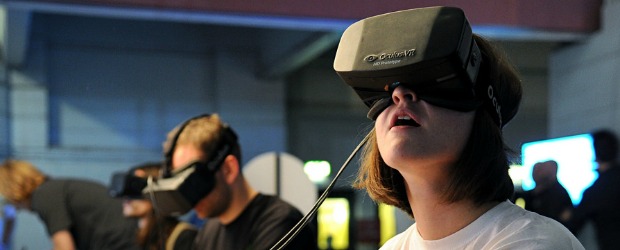You have no items in your cart. Want to get some nice things?
Go shopping
Virtual reality is returning to the public consciousness. Sony have announced a PlayStation 4 headset called Project Morpheus (presumably named after the god of dreams rather than the anti-VR activist of The Matrix), while fifth horseman of the apocalypse Mark Zuckerberg has gobbled up Oculus Rift, a PC-compatible technology largely responsible for the VR renaissance.
The child in me wants a go. I was brought up on Knightmare,and once had the pleasure of being bewildered by the crap polygons of Virtuality (an attempt at VR in the early 90s). The idea of such immersive games has appeal. As mobile technology makes us the last generation who can remember the feeling of getting lost, we could soon experience that confusion afresh in unmapped alien worlds. And who doesn’t want to experience the jump scares of being trapped in an underwater cage in Sony’s heart shark attack simulator The Deep?
There are applications beyond games. These interactive experiences could further blur the lines between games and art. We could explore the surface of Mars, or experience the wonder of safari without leaving crisp packets in jungles. It could even help us grow as people. We could decrease anxiety with biofeedback apps and carefully expose ourselves to stressful situations to build up our tolerance. We could befriend people from foreign lands (like we were going to with the Internet). We could all unite as a big human brain in a global neural network.
But mainly, we’ll use it to secretly masturbate. With wearying inevitability, Oculus Rift has a virtual sex game on the way, called Wicked Paradise. Meanwhile, Gender Swap, an experiment for two participants, will pave the way for you to literally go fuck yourself.
“After games,” frothed Zuckerberg on his press release via status update, “we’re going to make Oculus a platform for many other experiences. Imagine enjoying a court side seat at a game, studying in a classroom of students and teachers all over the world or consulting with a doctor face-to-face.” So much more gravitas with these carefully picked examples than if he had said “imagine Farmville with real backache”. Cynics like me can be framed as luddites against education and health. He believes “this kind of immersive, augmented reality will become a part of daily life for billions of people” (as did Facebook). He “can’t wait to start working with the whole team at Oculus to bring this future to the world”. Scared yet? He believes Oculus could become “the most social platform ever”, implying Facebook would use Oculus as part of its advertising push.
I can’t help but be disappointed that the future isn’t what it used to be. I’d rather our forays into transhumanism have a scuzzy cyberpunk ethos than be plated in shiny blue as Facebook merrily ‘extend[s] to new verticals’. I’d prefer the aesthetics of Tron and The Lawnmower Man to the trivial sheep-shuffling of what Stewart Lee called out as ‘the Angry Birds generation’.
We have a problem. Technology surges forward yet it is developed and marketed to us by capitalists whose chief aim is to make money. In contrast to our rapid technological advances, our evolutionary adaptation is slow to respond. We are overwhelmed by supernormal stimuli that hook straight into our survival systems, a position of weakness systematically mined by the money-makers who, taking Big Food as an example, use lurid colours to attract us to engineered and naturally impossible high-fat, high-sugar, high-salt foods that melt the moment we put them on our tongue. This moreish food creates damaging insulin spirals, excess fat storage and metabolic derangement, coupled alongside self-reproof as we chasten ourselves and wish we looked more like the oiled Photoshop bodies looking down on us from every quarter.
Technology has blossomed in this environment. It has always changed us and today we contend with internet addiction, a reduced ability to focus and the Facebook blues. Smartphones can make us tired and unproductive and most of us aware enough to care realise how powerful they are in creating compulsive behaviour. Internet porn messes up our reward circuitry and creates increasingly extreme erotic tastes. Check your Facebook settings before you indulge on your Oculus Rift, lest your koala bukkake orgy be visible on your timeline. (Did I mention privacy and how it is almost dead? How Mark Zuckerberg once offered his ‘dumb fuck’ Facebook users’ private data to a friend to show off? I’ve worried about that site on these pages before.)
Meanwhile, the blue light emanating from these devices affects our melatonin production and reduces our sleep quality and quantity; something that can affect emotion, cognitive ability and ability to be realistic about one’s own cognitive impairment. Being tired changes our personality, and most people we know are tired. It makes me wonder – what are we really like?
It seems to me that already, before VR goes mainstream, we’re doing a poor job of tempering the benefits and amusements of consumer technology with moderation and mindfulness about its distracting effects. That word, ‘mindfulness’, may hold the answer. With Mindfulness-Based Cognitive Therapy (MBCT) and Mindfulness-Based Stress Reduction (MBSR) before it, the secularised ‘technology’ of Buddhist psychology is experiencing a growth in popularity, and at a time when we most need it. There’s an irony in the fact that both the mindfulness and VR worlds use the word ‘presence’. One of these quotes is by Zen Master Thich Nhat Hanh, the other by Zuckerberg – can you tell who said what?
“The most precious gift we can offer others is our presence.”
“By feeling truly present, you can share unbounded spaces and experiences with the people in your life.”
I favour the notion of feeling present in the real world to a feeling of presence in an artificial world, mainly because the graphics are better. But perhaps they are both illusions anyway.
Like brains in jars, or people farmed in pods, we live too much in our heads as it is, let alone before we wrap screens around our faces. Schoolchildren bring their minds to class and leave their high spirits, physicality and spontaneous emotional expressions in the playground. After all, Michael Gove needs them to concentrate on a battery of tests. Emotionally constipated adults freeze uncertainly when strangers experience despair or colleagues are bereaved. Therapists make a living from helping people discover feelings they hadn’t been aware of. People experimenting with mindfulness quickly discover how numb their bodily-felt feeling has become (what’s going on for your left calf right now)? We listen to birds singing less often than we lob them at animated pigs, and look for the feeling of ‘presence’ in new worlds when we’ve barely lived in this one.
But perhaps I’m drowning my point in pixels. Virtual Reality is not the end of the analogue world. It’s not even a real break in paradigm from previous technologies and gaming developments – not substantially different from Google Glass, Google Maps, Google Search, ICQ, Usenet, bulletin boards, Zork, Space Invaders, the television, the wireless, the cinema, the book or the theatre of Dionysus. But every turn we take on this journey gets us closer to our destination, and it’s the rich now driving the car. Or it would be if Google’s new driverless cars didn’t date this analogy.
What our bedazzled primate brains may not see is that the reason Virtual Reality has such appeal is because it exploits (and diverts) the desire to live actual reality more meaningfully; to connect empathically with others and partake in their joys and adventures, to experience everything in the world and dissolve the walls between us. It’s why we have so many books. Like the novel did in its early days, VR will raise concerns about rotting the mind, yet will provide some with enriching artistic experiences of empathic immersion. It’s our need for story that makes these machines appealing, but that need could be used against us and lead us further away from a deep experience of the world as it is. And what would you call a project that gets you hooked on dreams? I know what I’d call it.

About Daevid Glass
Daevid reverse-engineers morsels of reality and extracts their meaning, injecting this concentrate into carefully assembled words and hoping for a positive outcome. This process began when, as a child in Essex, a school teacher asked him to write a poem about a rocket launch. He hasn't stopped writing since – primarily prose fiction but also arts criticism and film and radio scripts, having had the pleasure of taking a creative writing degree along the way. He lives in Oxfordshire on the isle of Albion and is working on his novel, Resuscitating God.




Something to do with your time while waiting on line.